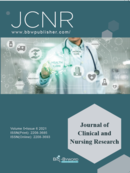Abstract
Aim: To study the clinical effect and safety of iron supplementation in the treatment of mild thalassemia complicated by iron deficiency in late pregnancy. Methods: 376 patients with mild thalassemia complicated by iron deficiency in late pregnancy treated in our hospital from July 2019 to June 2021 were selected and recruited in the research group, and 200 normal pregnant women treated in the same period were selected and recruited in the control group. Hemoglobin (Hb), reticulocyte blood, red blood protein (RET he) level, ferritin (SF) level, soluble transferrin receptor (sTfR) level, adverse maternal and infant outcomes, etc. were analyzed. Results: There was no significant difference in the levels of SF, Hb, RET he and sTfR between the two groups before treatment. After treatment, the levels of SF, Hb, RET he and sTfR in the research group were significantly improved, which was statistically significant compared with the control group. The frequencies of intrapartum hemorrhage, premature delivery, stillbirth, hemorrhagic shock, and neonatal asphyxia in the research group were 289±47.88, 36 (9.57%), 0 (0.00%), 25 (6.65%), and 6 (1.26%), respectively. The frequencies of intrapartum hemorrhage, premature delivery, stillbirth, hemorrhagic shock, and neonatal asphyxia in the control group were 284 ± 46.99, 7 (3.50%), 0 (0.00%), 6 (3.00%), and 0 (0.00%), respectively. There were significant differences in preterm delivery and hemorrhagic shock, and there was no significant difference in other delivery outcomes. Conclusions: Under the premise of strictly controlling the iron reserve in pregnant women, continuous medication until the end of delivery may be conducive to the control of maternal thalassemia complicated by iron deficiency and the improvement of pregnancy outcome.
References
Cheng J, 2021, Changes of Hemoglobin and Ferritin Levels During Pregnancy and Pregnancy Outcome in Patients with Mild Thalassemia. Jilin Medical Journal, 42(07): 1718-1719.
Hong X, Yu H, Wu H, 2020, Study on Shengxuening Tablets to Improve the Anemia Degree of Pregnant Women with Mild Thalassemia. Modern Hospital, 20(07): 1065-1067.
Peng B, Wang B, Zeng Q, et al., 2020, Diagnosis and Efficacy Evaluation of RET he on Iron Deficiency in Pregnant Women with Mild Thalassemia. China Tropical Medicine, 20(06): 552-556.
Hu C, Yin C, 2020, Feasibility Study on Iron Supplementation for Pregnant Women with Mild Thalassemia Complicated with Iron Deficiency in Late Pregnancy. Journal of Preventive Medicine of the People’s Liberation Army, 38(03): 40-42.
Qiu T, Yin C, 2018, Study on Iron Metabolism of Pregnant Women with Mild Thalassemia. China Maternal and Child Health Research, 29(07): 853-856.
He L, Gan H, Li M, 2015, Diagnosis and Treatment of Pregnancy Complicated with Mild Thalassemia. China Maternal and Child Health Care, 30(36): 6545-6547.
